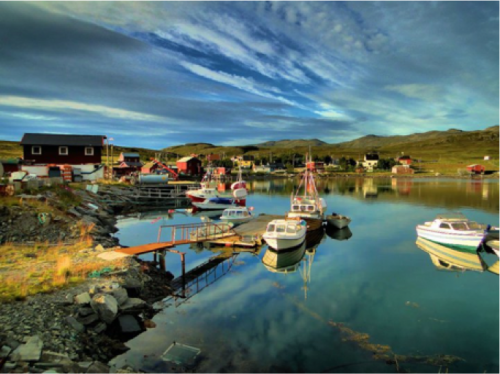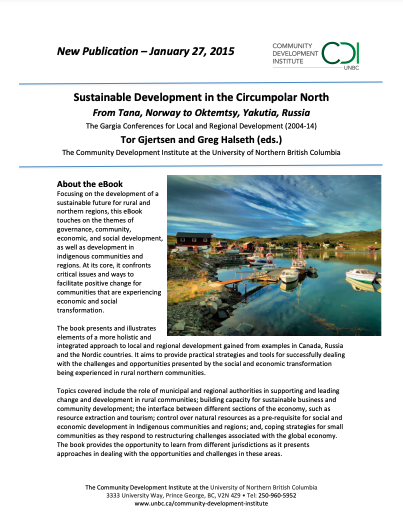Focusing on the development of a sustainable future for rural and northern regions, this eBook touches on the themes of governance, community, economic, and social development, as well as development in indigenous communities and regions. At its core, it confronts critical issues and ways to facilitate positive change for communities that are experiencing economic and social transformation.
The book presents and illustrates elements of a more holistic and integrated approach to local and regional development gained from examples in Canada, Russia and the Nordic countries. It aims to provide practical strategies and tools for successfully dealing with the challenges and opportunities presented by the social and economic transformation being experienced in rural northern communities.
Topics covered include the role of municipal and regional authorities in supporting and leading change and development in rural communities; building capacity for sustainable business and community development; the interface between different sections of the economy, such as resource extraction and tourism; control over natural resources as a pre-requisite for social and economic development in Indigenous communities and regions; and, coping strategies for small communities as they respond to restructuring challenges associated with the global economy.
The book provides the opportunity to learn from different jurisdictions as it presents approaches in dealing with the opportunities and challenges in these areas.
This publication will be of interest to community and non-profit organizations, government representatives, policy makers, and academics interested in matters critical to northern community and economic development. Published on the occasion of the 10th anniversary of the Gargia Conferences for Local and Regional Development, hosted by the University of the Arctic’s Thematic Network on Local and Regional Development, the book represents a decade of international collaboration.
The book is being co-published by the Community Development Institute at the University of Northern British Columbia and the University of the Arctic’s Thematic Network on Local and Regional Development in the North. It has been released as an eBook in order to maximize and enhance the accessibility of the information.
Read the eBook: Sustainable Development in the Circumpolar North
Table of Contents
| Foreword | |
| Introduction | |
| The Gargia-Oktemtsy Conferences | |
| 1. Changes in rural governance and development | |
| 1.0 “It has to be both problem and problem-solving oriented, to be relevant for us.” | |
| 1.1 International partnership in development of a local community as a condition of the sustainable development of rural communities in the Russian North – Oksana Romanova and Klavdiya Barashkova | |
| 1.2 International cooperation among northern regions as a factor in improving the level and quality of life – Vera Smorchkova and Alexey Titovskiy | |
| 1.3 Managing sustainable development of rural communities in northern Russia – Galina Knyazeva and Ekaterina Kniazeva | |
| 1.4 Local governance and crisis management in Gamvik Municipality, in northern Norway: The role and participation of local authorities and voluntary organizations – Tor Gjertsen | |
| 2. Ecology and sustainable business and community development | |
| 2.0 “Cod fishing in millennia versus oil drilling for maximum 50 more years?” | |
| 2.1 Viable communities in the North? – Nils Aarsæther | |
| 2.2 Local and regional development toward sustainable communities in the Komi Republic – Julia Loginova | |
| 2.3 The municipality of North Cape, a “fringe” community under development – Stig Hansen | |
| 2.4 Norwegian development politics for the north, and for the future of Finnmark – Gunnar Reinholdtsen | |
| 3. Youth, Entrepreneurship and rural development | |
| 3.0 “Without youth, no future…” | |
| 3.1 Work and entrepreneurship in Alta 2009-2012 – Tor Helge Reinsnes Moen and Trond Einar Persen | |
| 3.2 From Izhma to Kortkeros, building development partnerships and networks in the Komi Republic: Challenges for young entrepreneurs – Valeria Gjertsen | |
| 3.3 The Gamvik project for youth fishing – Øyvind Berg and Tor Gjertsen | |
| 4. Sport, tourism and rural development | |
| 4.0 “North Cape, more than a tourist icon and magnet.” | |
| 4.1 Sport, tourism, and community development: The case of Izhma region – Julia Loginova and Valerij Rochev | |
| 4.2 Sport, enthusiasm, and industrial development in remote rural places? – Yngve Johansen | |
| 4.3 National holidays as multiplier of ethno-tourism in the Komi Republic – Galina Gabucheva | |
| 4.4 Tourism development in Saami communities in Finland – Eeva-Maarit Aikio | |
| 5. Social and economic development in indigenous communities and regions | |
| 5.0 “Between tradition and modernity… “ | |
| 5.1 The nature of Finnmark between traditional use, international capital, and central political power – Svein Lund | |
| 5.2 The right to traditional resources and development programs – Steinar Pedersen | |
| 5.3 How are Indigenous peoples and communities in northern Yakutia affected by industrial development? – Vyasheslav Shadrin | |
| 5.4 Development challenges in Indigenous communities in Swedish Sapmi – Stefan Mikaelson | |
| 6. Innovation, networking, identity formation as coping strategies | |
| 6.0 “We must ask the right questions” | |
| 6.1 Constructing rural places in a globalized world: Place-based rural development seen from northern British Columbia, Canada – Greg Halseth, Don Manson, Laura Ryser, Sean Markey and Marleen Morris | |
| 6.2 Social-economic determinants of innovative development of the northern territories of Russia – Natalia Okhlopkova | |
| 6.3 Coping strategies in the North: A model for community restructuring applied to Northern Norway – Nils Aarsæther | |
| 6.4 Sami education and development, between tradition and modernity – Jan Henry Keskitalo | |
| 7. Conclusion: Knowledge and capacity building in rural development | |
| “Work done and lessons learned…” | |
| Ten years of knowledge and capacity building: Work done and lessons learned … – Tor Gjertsen | |
| Afterword/closing message – Oksana Romanova | |






